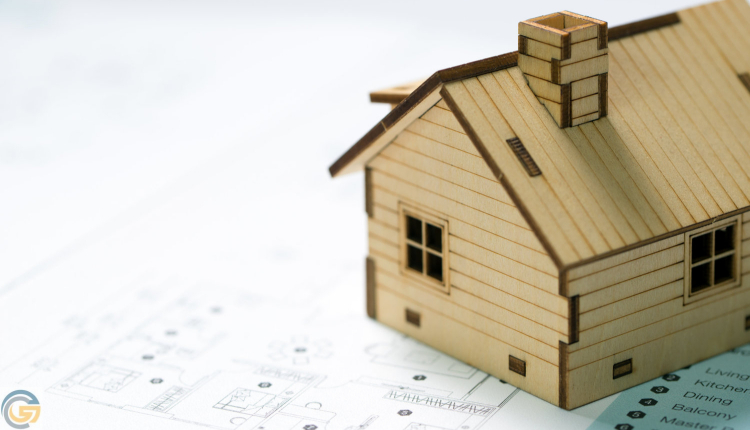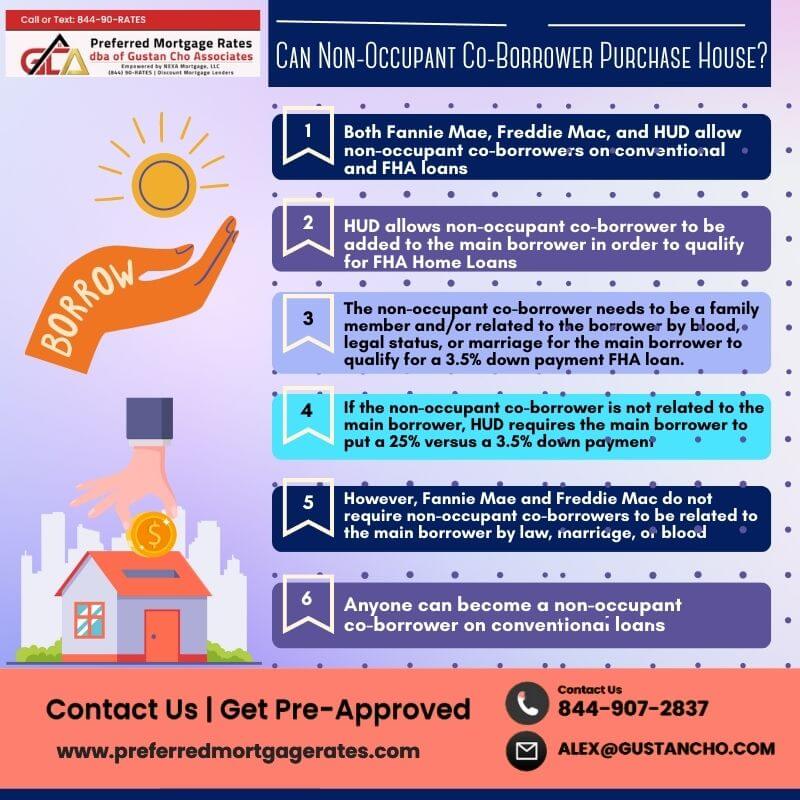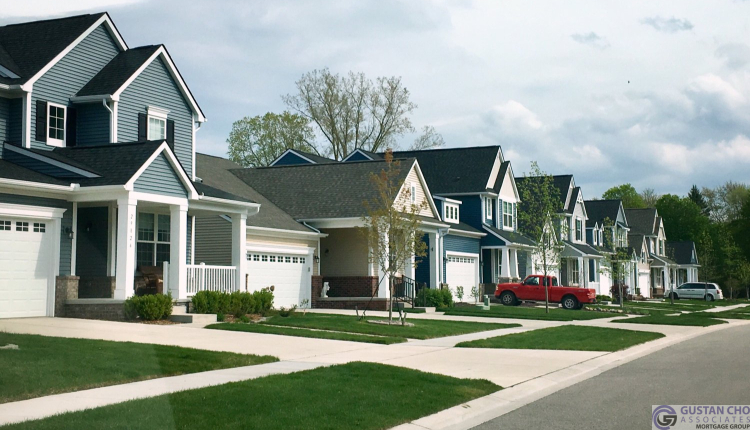Can Non-Occupant Co-Borrower Purchase House?


This Article Is About Can Non-Occupant Co-Borrower Purchase House
Can Non-Occupant Co-Borrower Purchase House If They Become A Non-Occupant Co-Borrower? Many non-occupant co-borrowers are afraid to help out a family member as a non-occupant co-borrower if they do not own a home yet. However, the non-occupant co-borrowers debt to income ratio will not affect them in qualifying for a mortgage if the main borrower has closed on their mortgage loan and has made 12 timely payments. After the main borrower has made 12 timely payments on their mortgage loan, the non-occupant’s debt to income ratio is not affected when qualifying for a new mortgage of their own. However, the risk is if the main borrower has made late payments. Then the late payment of the main borrower will affect the non-occupant co-borrower from qualifying for a mortgage. In this article, we will discuss and cover how a non-occupant co-borrower will not be affected by qualifying a mortgage on their own after they have co-signed for someone else on a home loan.

Adding Non-Occupant Co-Borrower And How It Affect On Qualifying For Their Own Mortgage

Both Fannie Mae, Freddie Mac, and HUD allow non-occupant co-borrowers on conventional and FHA loans. HUD allows non-occupant co-borrower to be added to the main borrower in order to qualify for FHA Home Loans. The non-occupant co-borrower needs to be a family member and/or related to the borrower by blood, legal status, or marriage for the main borrower to qualify for a 3.5% down payment FHA loan. If the non-occupant co-borrower is not related to the main borrower, HUD requires the main borrower to put a 25% versus a 3.5% down payment. However, Fannie Mae and Freddie Mac do not require non-occupant co-borrowers to be related to the main borrower by law, marriage, or blood. Anyone can become a non-occupant co-borrower on conventional loans.

Non-Occupant Co-Borrower Mortgage Guidelines
The non-occupant co-borrower needs to qualify under FHA Guidelines. If the non-occupant co-borrower has a bankruptcy, foreclosure, deed in lieu of foreclosure, and/or short sale, the same waiting period applies as the main borrower. The non-occupant co-borrower needs to wait two years after a discharge date of Chapter 7 bankruptcy if he or she had filed a prior bankruptcy to qualify for FHA Loans. The non-occupant co-borrower needs to wait 3 years from the recorded date of foreclosure or deed in lieu of foreclosure if they had a prior foreclosure or deed in lieu of foreclosure to qualify for FHA Loans. The non-occupant co-borrower needs to wait three years from the HUD’s settlement date if they had a prior short sale to qualify for FHA Home Loans. The non-occupant co-borrower is not on title and only on the mortgage note. The same rules and guidelines apply to conventional loans. Non-occupant co-borrowers need to meet conventional loan guidelines as well.
Can Non-Occupant Co-Borrower Purchase House Later

The answer to the question of Can Non-Occupant Co-Borrower Purchase House is yes. Non-occupant co-borrowers often wonder if co-signing for a family member will affect their chances of buying a home of their own later. By being a non-occupant co-borrower they can still qualify for a mortgage on their own with the debt that they co-signed not affecting them. How can this be? The future mortgage lender will not take into account the co-signed mortgage liability if and only if they can provide them with the main borrower’s 12 months cancelled checks to the mortgage company the main borrower has been making payments to. Although it is on a credit report, the future lender will not count it as a liability as long as the main borrower has closed on their home loan and have made 12 monthly payments. This only applies if they can provide them with 12-months of cancelled checks and/or bank statements from the main borrower they have cosigned. Unfortunately, if the person they have co-signed for has been late on their mortgage payments, it will affect credit scores negatively.

Can Non-Occupant Co-Borrower Purchase House With No Credit Scores
Sometimes borrowers will have a non-occupant co-borrower with no credit scores
- Non-occupant co-borrowers with no credit scores are allowed only if they have 12 months rental verification and non-traditional credit tradelines
- As long as the non-occupant co-borrower has twelve months cancelled checks paid to the landlord
- Plus three non-traditional credit tradelines
Non-Traditional credit tradelines are creditors that do not report to the three major credit bureaus:
- Utility bills
- Cell phone
- Auto insurance
- Tuition
What If Non-Occupant Co-Borrower Has Bad Credit?

Non-Occupant Co-Borrowers With Bad Credit

If the non-occupant co-borrower has bad credit, it can pose a problem. All lenders will take the lower borrowers middle credit scores and use that as the qualifying credit score. To qualify for an FHA insured mortgage loan with only a 3.5% down payment, the minimum credit score required is 580. In the event, if the non-occupant co-borrower has a credit score below 580, the loan originator can possibly help them boost their credit scores up so it surpasses the 580 mark. There are some quick fixes to boost up the credit scores and a rapid rescore can be done.
Qualifying For Mortgage With Direct Lender With No Overlays
Home Buyers who need to qualify for a mortgage with a mortgage company licensed in multiple states with no overlays can contact us at Gustan Cho Associates at 800-900-8569 or text us for a faster response. Or email us at gcho@gustancho.com. Gustan Cho Associates has zero lender overlays on FHA, VA, USDA, and Conventional Loans. Gustan Cho Associates are also correspondent lenders and brokers on non-QM loans and bank statement loans for self-employed borrowers. The team at Gustan Cho Associates is available 7 days a week, evenings, weekends, and holidays.


